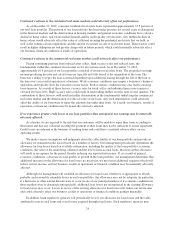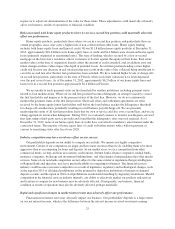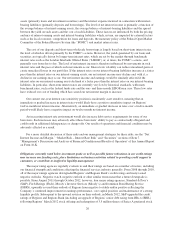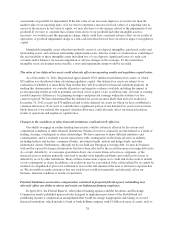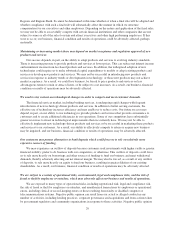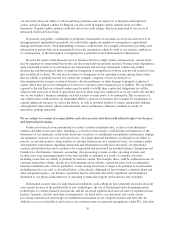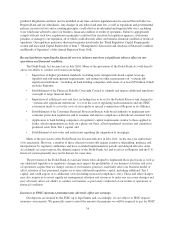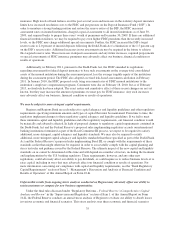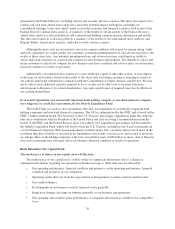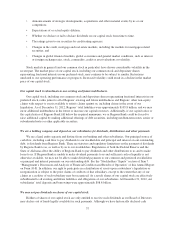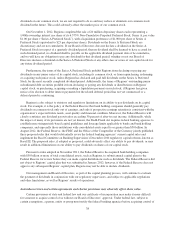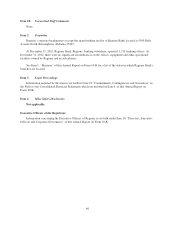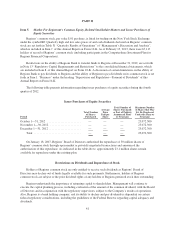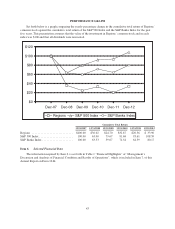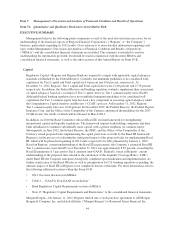Regions Bank 2012 Annual Report Download - page 50
Download and view the complete annual report
Please find page 50 of the 2012 Regions Bank annual report below. You can navigate through the pages in the report by either clicking on the pages listed below, or by using the keyword search tool below to find specific information within the annual report.predicted. Regulations and laws may be modified at any time, and new legislation may be enacted that will affect us,
Regions Bank and our subsidiaries. Any changes in any federal and state law, as well as regulations and governmental
policies, income tax laws and accounting principles, could affect us in substantial and unpredictable ways, including
ways which may adversely affect our business, financial condition or results of operations. Failure to appropriately
comply with any such laws, regulations or principles could result in sanctions by regulatory agencies, civil money
penalties or damage to our reputation, all of which could adversely affect our business, financial condition or results of
operations. Our regulatory position is discussed in greater detail under the “Bank Regulatory Capital Requirements”
section and associated Capital Ratios table of Item 7. “Management’s Discussion and Analysis of Financial Condition
and Results of Operation” of this Annual Report on Form 10-K.
Recent legislation regarding the financial services industry may have a significant adverse effect on our
operations and financial condition.
The Dodd-Frank Act became law in July 2010. Many of the provisions of the Dodd-Frank Act will directly
affect our ability to conduct our business including:
• Imposition of higher prudential standards, including more stringent risk-based capital, leverage,
liquidity and risk-management requirements, and numerous other requirements on “systemically
significant institutions,” including all bank holding companies with assets of at least $50 billion (which
includes Regions);
• Establishment of the Financial Stability Oversight Council to identify and impose additional regulatory
oversight of large financial firms;
• Imposition of additional costs and fees, including fees to be set by the Federal Reserve and charged to
“systemically significant institutions” to cover the cost of regulating such institutions and any FDIC
assessment made to cover the costs of any regular or special examination of Regions or its affiliates;
• Establishment of the Consumer Financial Protection Bureau with broad authority to implement new
consumer protection regulations and to examine and enforce compliance with federal consumer laws;
• Application to bank holding companies of regulatory capital requirements similar to those applied to
banks, which requirements exclude, on a phase-out basis, all trust preferred securities and cumulative
preferred stock from Tier 1 capital; and
• Establishment of new rules and restrictions regarding the origination of mortgages.
Many of the provisions of the Dodd-Frank Act became effective in July 2011, on the one-year anniversary
of its enactment. However, a number of these other provisions still require extensive rulemaking, guidance and
interpretation by regulatory authorities and have extended implementation periods and delayed effective dates.
Accordingly, in some respects, the ultimate impact of the Dodd-Frank Act and its effect on Regions and the U.S.
financial system generally may not be known for some time.
The provisions of the Dodd-Frank Act and any future rules adopted to implement those provisions as well as
any additional legislative or regulatory changes may impact the profitability of our business activities and costs
of operations, require that we change certain of our business practices, materially affect our business model or
affect retention of key personnel, require us to raise additional regulatory capital, including additional Tier 1
capital, and could expose us to additional costs (including increased compliance costs). These and other changes
may also require us to invest significant management attention and resources to make any necessary changes and
may adversely affect our ability to conduct our business as previously conducted or our results of operations or
financial condition.
Increases in FDIC insurance premiums may adversely affect our earnings.
Our deposits are insured by the FDIC up to legal limits and, accordingly, we are subject to FDIC deposit
insurance assessments. We generally cannot control the amount of premiums we will be required to pay for FDIC
34


